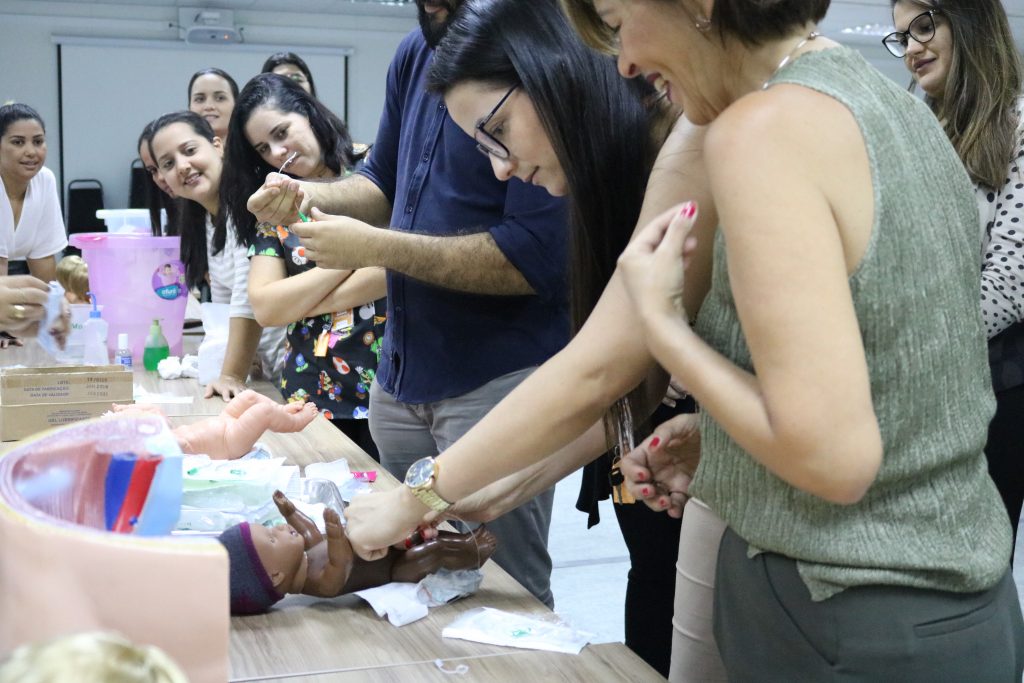On the 23rd and 24th of September the Anita Garibaldi Health Education and Research Center (CEPS) it received Grace Ferreira, nurse at the Pediatric Urodynamics Service at Oswaldo Cruz Foundation (Fiocruz), It is Juliana Marin, medicated Fernandes Figueira Institute (IFF/Fiocruz), to provide Clean Intermittent Catheterization workshops.
Catheterization consists of inserting a clean catheter into the bladder to allow it to be emptied, and is one of the treatments used in patients affected by diseases of the central nervous system or peripheral nerves who suffer from the inability to control the act of urinating. This bladder dysfunction is called Neurogenic Bladder (BN).
Initially, the professionals met with parents and caregivers of children with BN assisted by CEPS to teach them the technique correctly and safely. The second moment was with professionals from the Family Health Strategy (ESF) program in Macaíba (RN), with the aim of training these health professionals on how they should teach parents and caregivers of children to perform the technique correctly.

Health cooperation
Since 2016, CEPS has been authorized by the Ministry of Health as a Specialized Rehabilitation Center (CER III) and offers care for physical, intellectual and hearing disabilities for patients in the metropolitan region of the capital of Rio Grande do Norte: Natal, Macaíba, São Gonçalo do Amarante, Parnamirim and Extremoz . The Anita Garibaldi Center CER offers services distributed across clinics, one of which is specifically aimed at patients with Neurogenic Bladder.
The Director General of Santos Dumont Institute (ISD), Reginaldo Freitas Junior, stated that carrying out this training with ESF professionals is essential so that there is unanimity in the information about the catheterization technique that is passed on to the patients receiving care, avoiding contradictions in what is taught by the professionals.
About the initiative, Grace Ferreira declared: “The conversation with parents and training with health professionals about catheterization was the beginning of a new look at children with Neurogenic Bladder. It also opened up the opportunity to learn about other realities and rethink our service. That's what health cooperation is and it only works if it's bilateral. New ideas emerge, we recover lost practices and improve our assistance. We all win, especially the patients and their families.”
Neurogenic Bladder Journey
For the third consecutive year, the Santos Dumont Institute and the Federal University of Rio Grande do Norte (UFRN) will promote the Multiprofessional Intervention in Neurogenic Bladder Day (JIMBN), on December 6th and 7th, 2019. The event is aimed at professionals and undergraduate and postgraduate students from different areas of health and offers lectures and mini-courses on the topic . Find out more details about programming and registration HERE.
Text and photos: Dandarah Filgueira – Journalism Intern / Ascom – ISD
Communication Office
comunicacao@isd.org.br
(84) 99416-1880
Santos Dumont Institute (ISD)
Social organization that maintains ties with the Ministry of Education (MEC) and whose mission is to promote education for life, forming citizens through integrated teaching, research and extension actions and to contribute to a fairer and more humane transformation of the Brazilian social reality.













